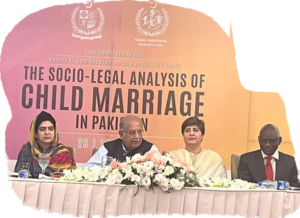Consultation on “The Socio-Legal Analysis of Child Marriage”

Consultation on “The Socio-Legal Analysis of Child Marriage”
ISLAMABAD, Report (imrana komal)
The National Commission on the Rights of Child (NCRC) convened a consultation titled “The Socio-Legal Analysis of Child Marriage” at local Hotel Islamabad where NCRC launched the Policy Brief on the Legal Framework of Child Marriage in Pakistan, and findings of the KAP (Knowledge, Attitude, Practices) Survey conducted in collaboration with the UNICEF Pakistan.
Ms. Afshan Tehseen, Chairperson of the National Commission on the Rights of Child, highlighted the role of the Commission. The Commission has been actively working for the compliance of the UN Convention on the Rights of Child, 1989 in Pakistan which was ratified by the Government of Pakistan in 1990. The Chairperson was of the opinion that the Government of Pakistan both at federal and provincial level has enacted a number of child protection legislation in the last decade however lacks implementation. The Chairperson shared that the NCRC reviewed national and provincial child marriages laws in Pakistan, and issued the policy brief to provide recommendations to the government of Pakistan and other stakeholders to address the issue of child marriage in Pakistan.
NCRC presented the findings of the Policy Brief on the Legal Framework on Child Marriage before the participants highlighting Pakistan’s national and international commitments as well as various gaps in the prevailing laws.
Ms. Susan Andrew, Child Protection Specialist UNICEF shared the key findings of KAP Survey conducted in collaboration with the NCRC. Some of them are: (i) child marriage in Pakistan is high, and about the 6th highest in the world for girls married before the age of 18 years (ii) children are not actively involved in the decision making process around their marriage (iii) most children are also not aware that there are laws prohibiting child marriage and few children only know the minimum legal age for marriage (iv) half of adult respondents are aware that child marriage leads to increased health risks for the girl (v) respondents expressed unease about confronting parents or community members about a child marriage (vii) Women were more likely to cite gender based violence, depression and poverty as the main negative consequences of child marriage.
Federal Minister for Human Rights, Mr. Mian Riaz Hussain Pirzada in his speech appreciated the efforts of NCRC in taking up child protection issues across the country. He remarked that Pakistan is over legislated in terms of legislation but there are many hurdles in implementation and the government is working at addressing overcoming systematic and societal challenges. He said lack of education is also one of the major contributing factors in the early marriage of children in Pakistan. He also shared that there is unnecessarily sensitivity around the issue, and the minority community is being exploited. We must do more to protect our children in Pakistan. The Federal Minister of Human Rights emphasized that MoHR is very much committed to take up all human rights issues in Pakistan and they will take action wherever they see human rights or child rights violations.
Mr. Kheal Das Member National Assembly Pakistan raised the issue of underage Hindu girl Chanda who was abducted from Hyderabad Sindh few days back. He said, minority needs child marriage laws so their girls can be saved. He said the external environment is hostile where they cannot talk freely. There are several incidences of forced conversion and the majority of girls are underage. He appreciated that the age in Sindh Child Marriage Restraint Act, 2013 the marriagble age for girl child has been raised to 18 however the law is poorly implemented. He remarked that it is the high time that we all need to sit together, speak openly and devise strategies to address child marriages and forced conversion issues in Pakistan.
Dr. Inoussa Kabore, Deputy Representative Unicef expressed that a positive and conducive environment can give a better life to children. Dr. Kabore pressed about the situation of child marriages in Pakistan that the prevalence is high and needs to be addressed for its eradication. Dr. Kabore explained that the child marriage adversely affects maternal mortality and that further leads to malnutrition and mortalities. Child marriage is a serious threat to the nourishment of young girls. The economic and physical security of girls are the compelling reasons for child marriages.
Asiya Arif, Executive Director of SPARC, lamented that the number of child brides in Pakistan remains high at 6th place in the World. Pakistan is among countries with low female labour force participation in South Asia which stands at 22%. Early marriage and low education only give rise to unskilled domestic forced labour. She reiterated on addressing issues of male victims of child marriage who may drop out of school and accept low socio-economic jobs to support the newly formed families.
Ms. Raheela Durrani, Former Speaker Balochistan Assembly expressed that Balochistan is very scattered in terms of population and due to poverty and remoteness prevalence of child marriages are very high. Ms. Durrani highlighted that high mortality is the direct result of child marriages. She emphasized that the government needs to introduce new legislation, a separate health system for mothers, and importance for raising awareness among the community on the harms of child marriages.
Prof. Dr. Muhammad Zial ul Haq, DG Islamic Research Institute thanked NCRC for holding consultation. Dr. Haq explained that there are no direct verses regarding child marriages in Sharia however a person should be entered in marriage when is capable to understand. Child marriages were the practice of jahiliah (ignorance) which should be stopped. He said that the objective of shariah is the protection of life, property but these two rights are violated in child marriages which ultimately deprived most of the rights of children. He said the irony is that 60 percent of youth are terrified of this situation in the name of Islam. He recommends that marriage should not be allowed before 18 which is also the minimum age in several Islamic countries as well.
Ms. Mehnaz Akbar Aziz, Parliamentary Secretary for Law and Justice shared that recently a parliamentary committee has passed a resolution on child rights caucus in parliament. She explained that the Parliamentary Committee has been pushing the agenda of child rights for many years but still there are several hindrances. Legislation is a cumbersome process, and legislation itself years which has been the case of ICT Domestic Workers Act, 2022 and ZARRA Act, 2020. There are many issues which are in the jurisdiction of the local government but unfortunately the local government system is not functional. Pakistan has made several international commitments and ratified UN convention that we need to comply and child rights should be addressed through the lens of UNCRC.
The event was well attended by parliamentarians, government officials, embassies, UN Agencies, national and international NGOs, lawyers and academia.

